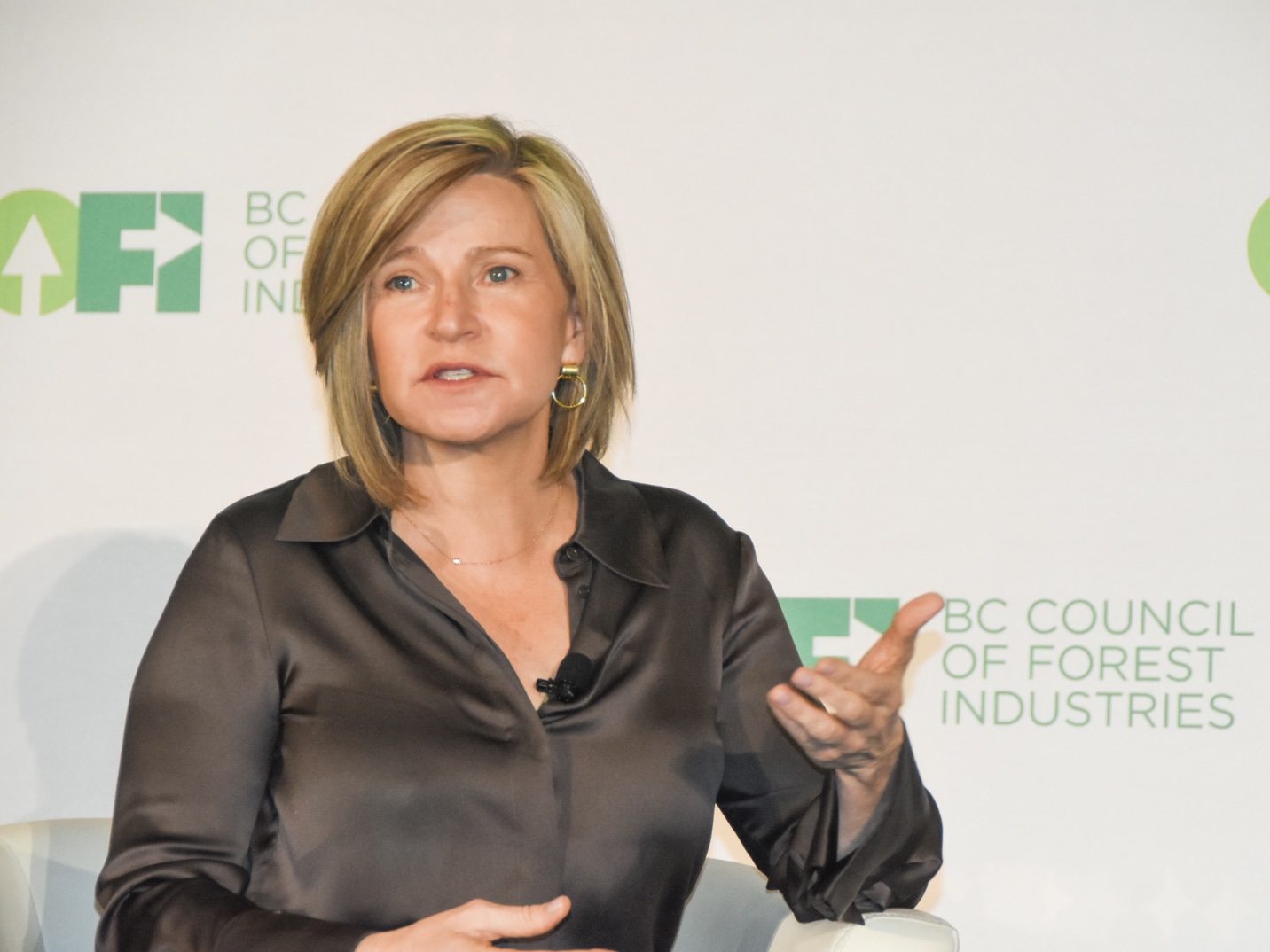
In her first public speech as the new president and CEO of CN, Tracy Robinson acknowledged the appropriateness of her presence at COFI, given that the forest sector has been ground zero on supply chain challenges and market volatility. As a key player in the forest sectors’ supply chain, Robinson noted that the “business relationship has been strained” during the pandemic, due in part to the many competing interests and pressures CN faces. “We don’t play favourites”, Robinson assured the delegates, “but we do need to better understand your industry’s issues and challenges, and your views on where increased services will be necessary in the future.” Looking forward, and referencing many of the current market and geopolitical uncertainties, Robinson said, “the questions are bigger than the answers”, but also that “CN is determined to be the best railway in North America and the path forward requires regular planning sessions with forestry leaders, a cooperative approach and a long term commitment to work together.”

Next up was Robert Johnston of the Eurasia Group, who spoke on four global risks facing the forest products sector. On China, Johnston noted the uncertainty resulting from covid’s resurgence and lock-downs due to government’s zero-covid strategy. The implications being more supply chain problems worldwide but also lower energy costs due to the reduced economic activity in China. On Russia and its war on Ukraine, Johnston said that, “regardless of the endgame, none of the multinationals that left Russia will be returning”; and that “the certainty of future gas shortages revives the potential for LNG in BC”. Johnston also said the war has raised the outlook for forest biomass and bioenergy, given the import of energy affordability and energy security when addressing climate change. Other risks noted include the US ‘culture wars’ and challenge of “engaging with the public and government in a steeply polarized world.”
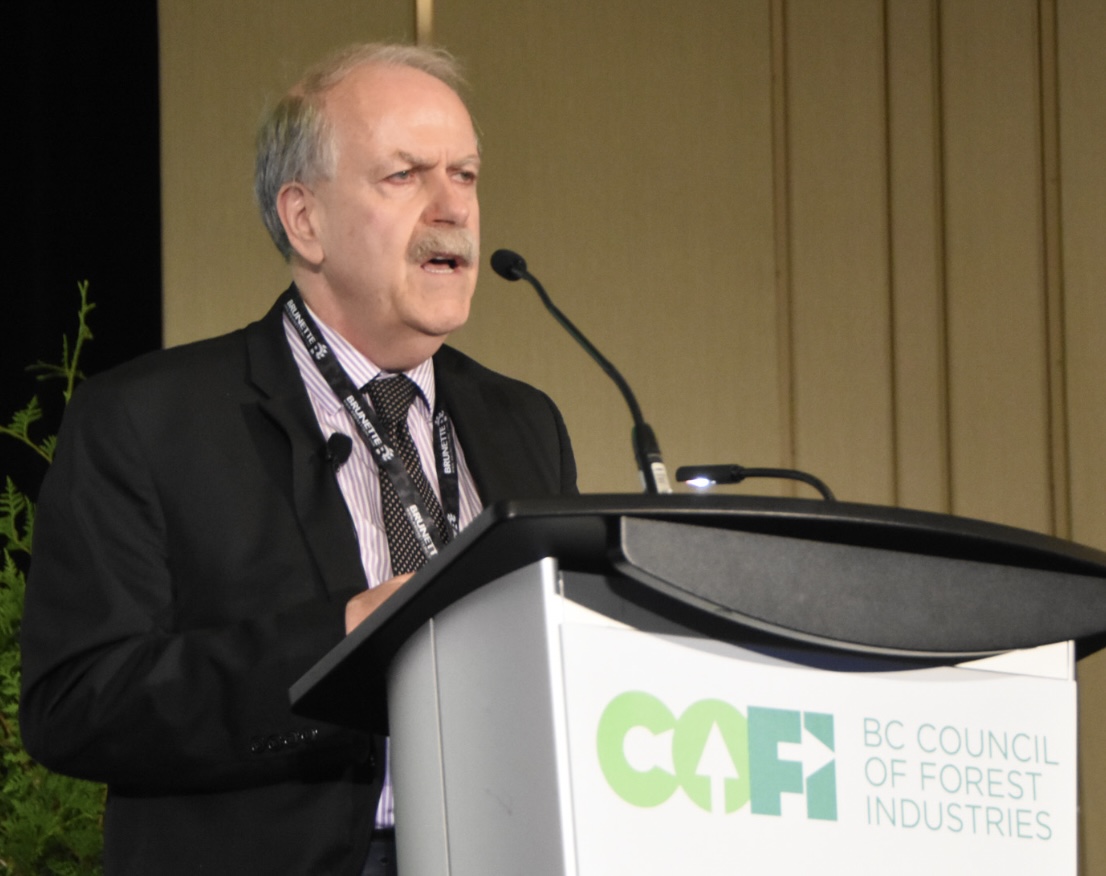 Jock Finlayson of the Business Council of BC, spoke of the headwinds facing Canada and BC due to slowing growth, inflation, recession risks, covid-shutdowns and rising business costs. More specifically, Finlayson noted the speed at which inflation has returned and the fact that it will be difficult to curb given that the cost increases are broadly distributed across many products and sectors. The ‘three-alarm fires’ for Finlayson include the weakness of the Canadian dollar at a time of high energy prices, Canada’s falling productivity per worker compared to the US, and Canada’s reduced market share of US imports—falling from #1 to #3 behind China and Mexico in two decades. Focusing on BC, Finlayson noted that although natural resources still “drive BC’s economic bus”, the regulatory environment is increasingly demanding. Per Finlayson, BC needs to reorient its thinking to firm up its economic base; improve the hosting conditions for capital investment; modernize and create ‘smart regulations’; and leverage BC’s low carbon advantages, where forestry has a vital role to play.
Jock Finlayson of the Business Council of BC, spoke of the headwinds facing Canada and BC due to slowing growth, inflation, recession risks, covid-shutdowns and rising business costs. More specifically, Finlayson noted the speed at which inflation has returned and the fact that it will be difficult to curb given that the cost increases are broadly distributed across many products and sectors. The ‘three-alarm fires’ for Finlayson include the weakness of the Canadian dollar at a time of high energy prices, Canada’s falling productivity per worker compared to the US, and Canada’s reduced market share of US imports—falling from #1 to #3 behind China and Mexico in two decades. Focusing on BC, Finlayson noted that although natural resources still “drive BC’s economic bus”, the regulatory environment is increasingly demanding. Per Finlayson, BC needs to reorient its thinking to firm up its economic base; improve the hosting conditions for capital investment; modernize and create ‘smart regulations’; and leverage BC’s low carbon advantages, where forestry has a vital role to play.
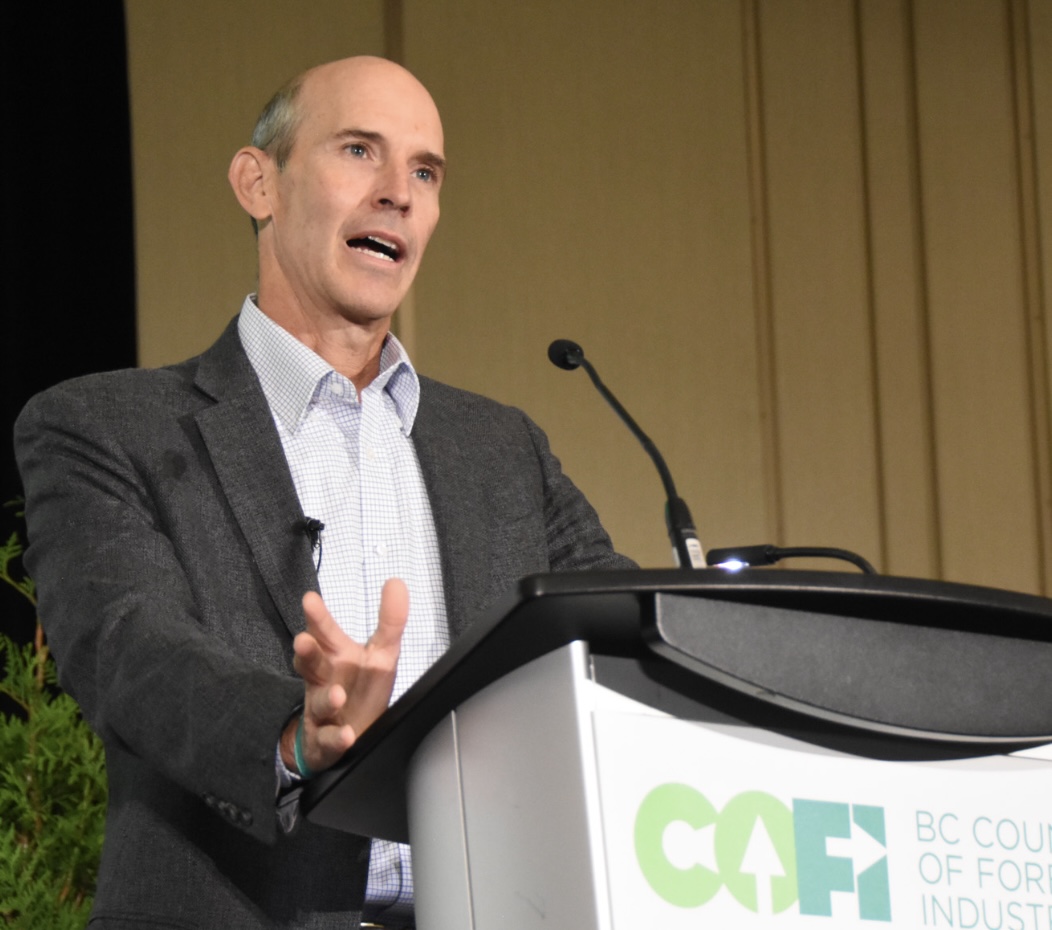 Paul Jannke of Forest Economic Advisors spoke of the changes in lumber trade flows due to the war, and the challenges of forecasting in today’s market. Jannke said that despite Russia’s small economy—less GDP than Canada with 4x the population—it is a significant market player with about 10% of the world’s oil exports and 10% of the world’s softwood lumber production. In total, Russian, Belarus and Ukrainian lumber represent about 10% of the EU lumber supply. Given the above, FEA is forecasting EU lumber exports to the US to fall, Russian shipments to China to rise, and North American shipment to China and the EU to fall. On the price front, FEA is forecasting lumber prices to remain elevated in high $500/MBF range, as housing starts remain relatively strong and lumber supply remains constrained.
Paul Jannke of Forest Economic Advisors spoke of the changes in lumber trade flows due to the war, and the challenges of forecasting in today’s market. Jannke said that despite Russia’s small economy—less GDP than Canada with 4x the population—it is a significant market player with about 10% of the world’s oil exports and 10% of the world’s softwood lumber production. In total, Russian, Belarus and Ukrainian lumber represent about 10% of the EU lumber supply. Given the above, FEA is forecasting EU lumber exports to the US to fall, Russian shipments to China to rise, and North American shipment to China and the EU to fall. On the price front, FEA is forecasting lumber prices to remain elevated in high $500/MBF range, as housing starts remain relatively strong and lumber supply remains constrained.
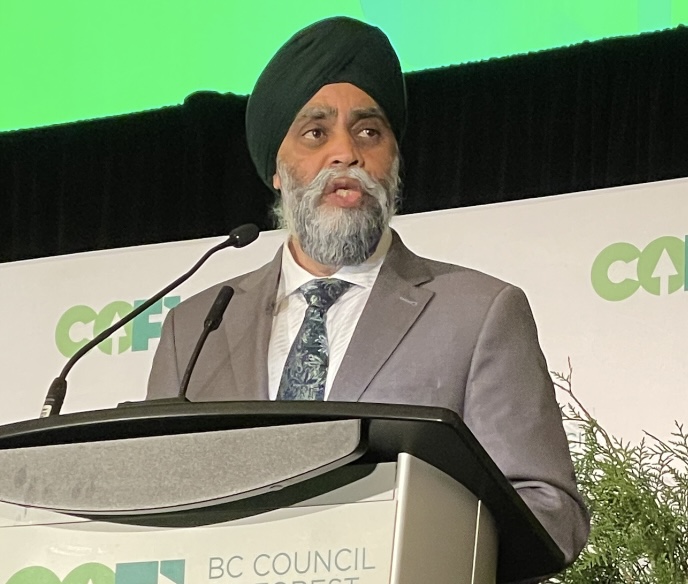 Luncheon keynote Harjit Sajjan, Minister of International Development, updated the delegates on PacifiCan, a new British Columbia-specific agency in 2021-22 with a $110 million budget. PacifiCan is the federal regional economic development agency for BC supporting business, innovation and community economic development, replacing Western Economic Diversification Canada—in place since 1987. Saijan also spoke of the government’s efforts, led by Minister of International Trade Mary Ng, to address trade irritants with the US, noting her upcoming talks with US Trade Representative Katherine Tai, as well as her outreach to others negatively impacted, such as US homebuilders.
Luncheon keynote Harjit Sajjan, Minister of International Development, updated the delegates on PacifiCan, a new British Columbia-specific agency in 2021-22 with a $110 million budget. PacifiCan is the federal regional economic development agency for BC supporting business, innovation and community economic development, replacing Western Economic Diversification Canada—in place since 1987. Saijan also spoke of the government’s efforts, led by Minister of International Trade Mary Ng, to address trade irritants with the US, noting her upcoming talks with US Trade Representative Katherine Tai, as well as her outreach to others negatively impacted, such as US homebuilders.
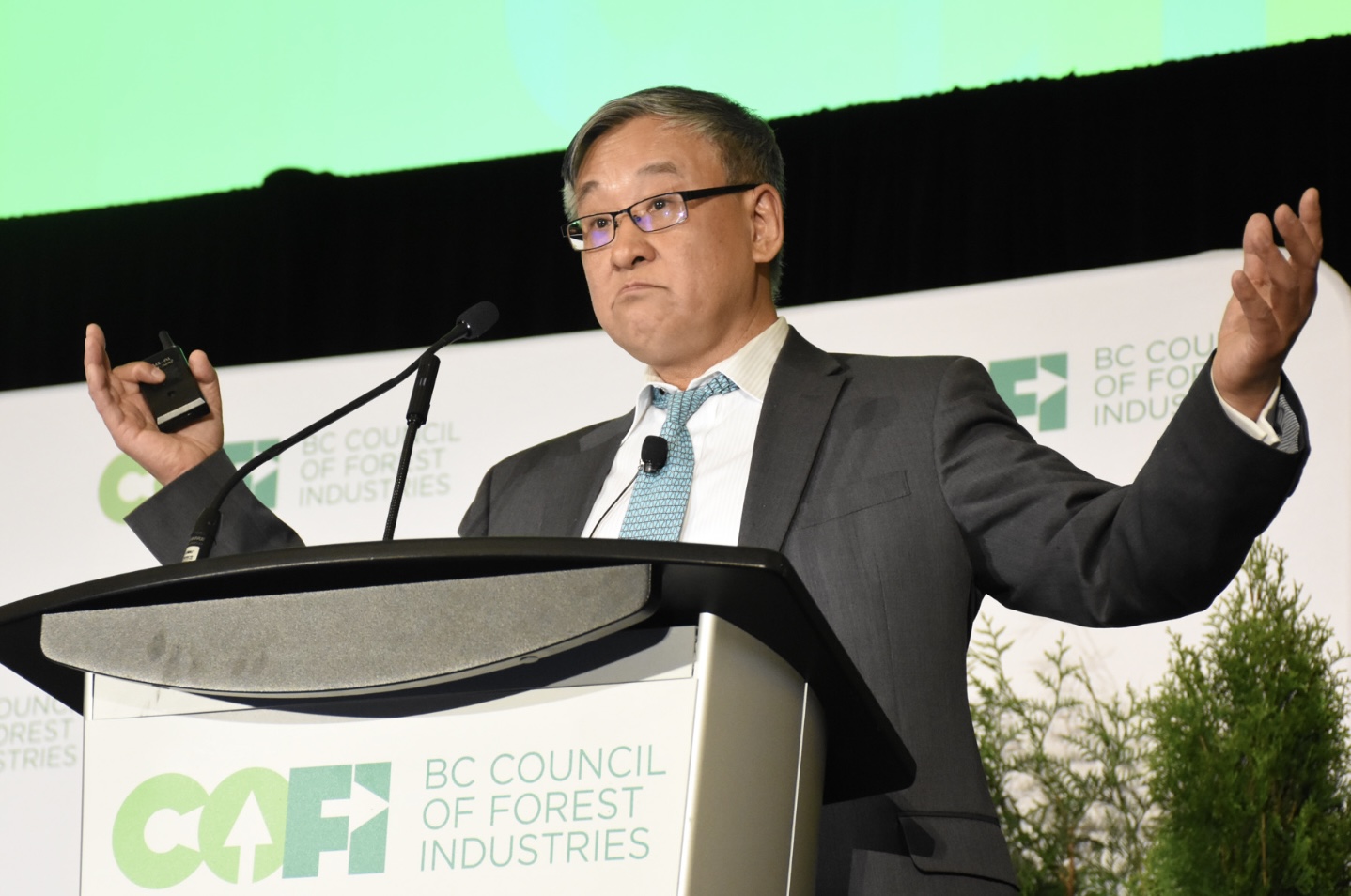 Finally, Dr. Wenran Jiang, President, Canada-China Energy & Environment Forum put a spotlight on China, how they perceive the world around them — they feel threatened — the state of Canada/China relations and the best path forward. Bottom line, the combination of the US/China trade war and the scale of US actions in support of Ukraine (e.g., sanctions, a freeze on Russia’s central bank assets, etc.), is interpreted in China as the “US sending a message to China on the future of Taiwan”. Canada’s lack of a reset with China (after the release of the two Michaels) and its public focus on “dealing with the China threat” exacerbates China’s fear of an ‘economic nuclear war’. Jiang concluded by saying that “a less ideological approach is required going forward… you can’t pick and choose’ with China.”
Finally, Dr. Wenran Jiang, President, Canada-China Energy & Environment Forum put a spotlight on China, how they perceive the world around them — they feel threatened — the state of Canada/China relations and the best path forward. Bottom line, the combination of the US/China trade war and the scale of US actions in support of Ukraine (e.g., sanctions, a freeze on Russia’s central bank assets, etc.), is interpreted in China as the “US sending a message to China on the future of Taiwan”. Canada’s lack of a reset with China (after the release of the two Michaels) and its public focus on “dealing with the China threat” exacerbates China’s fear of an ‘economic nuclear war’. Jiang concluded by saying that “a less ideological approach is required going forward… you can’t pick and choose’ with China.”